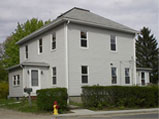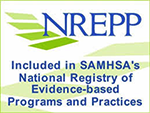|
DePaul UniversityCommunal Housing Settings Enhance Substance Abuse Recovery This is the publication of major findings from the two-year study of 150 individuals leaving treatment in Illinois with one-half randomly selected for post-treatment Oxford House living and one-half returning to their normal living situation. At the end of the period the relapse rate for those living in Oxford Houses was much lower than for those returning to “normal” living situations. (31.3% vs 64.8%). The researchers from DePaul University in Chicago and the University of Illinois, Chicago were funded by a NIAAA grant. (NIAAA grant AA12218) The research article is printed in the American Journal of Public Health, Oct 2006; Vol. 96, pp1727–1729 This research report looks at some of the detail [length of stay, co-occurring bi-polar conditions, criminal behavior] underlying the outcomes of recovery without relapse versus recovery interrupted by relapse. This NIAAA financed study was conducted by the DePaul Community Research Group and is an outgrowth of the basic study that followed 150 individuals leaving treatment with half randomly selected to go to an Oxford House and the other half going to normal post-treatment living situations. Publication: Addiction, Vol. 102, 1114–1121 [Final version accepted: February 20, 2007] The need for substance abuse after-care: Longitudinal analysis of Oxford House Funded by NIDA [Grant # DA 13231] this research report looks at the outcomes after following 897 Oxford House residents [604 men; 293 women] located in 219 Oxford Houses around the country following an initial interview and follow-up in four waves divided by 4-month intervals. At the outset, of the research each participant named an “important person” who knew him or her and could be used by researchers to verify abstinent claims of participant. Major finding include a relapse rate at end of period [approximately two years] of 13.5%. The 87% clean and sober outcome is four or five times greater than “normal” outcomes following detoxification and treatment. The study includes a number of other significant inter-relationships including length of stay, age, sex and co-occurring disorders. Publication: Addictive Behaviors 32 (2007) 803-818 [Final version accepted: June 14, 2006] Oxford House: Deaf-Affirmative Support for Substance Abuse Recovery The Oxford House Model works for all recovering alcoholics and drug addicts. This article by Josefina Alvarez, Ph.D. and others look at the application of Oxford House to those who are deaf. There is research involving a number of sub-groups with the recovery community. Dr. Alvarez’s article is included to illustrate the applicability of Oxford House to meet the needs of discrete subgroups of those in recovery. It is contained in Volume 151, No. 4, 2006 American Annals of the Deaf. Optimism, Abstinence Self-Efficacy, and Self-Mastery, A Comparative Analysis of Cognitive Resources This article from Assessment, Volume 11, No. 1, March 2004 57-63 by John M. Majer, PhD and others compares the rate at which recovering individuals gain sufficient self-confidence to likely stay clean and sober forever. Specifically, he compares a group living in Oxford House and going to AA/NA versus a similar group that just goes to AA/NA. The findings show that living in an Oxford House make positive self-efficacy and self-mastery happen faster. Oxford House: A Housing Solution For Residents With Dual Diagnosis. This study used a structured diagnostic interview to investigate the prevalence of psychiatric comorbidity among 29 men and 23 women substance abusers residing in 2 [one house for men and one for women] of 11 Oxford House communities located within a Mid-western metropolitan area. Researchers in this study tested 897 Oxford House residents [604 men /293 women] using Addiction Severity Index and calculated the Psychiatric Severity Index [PSI] to identify residents with moderate or severe co-occurring disorders. The results showed that both those with severe and moderate PSI indications did well in staying clean and sober, avoiding hospitalization and functioning well over time. In order to increase the number of these mutual-help recovery homes, two groups of states utilized state funds to hire recruiters and set up a loan fund to establish new OHs. Community - Based Homes Seem to Help Addicts AP Story in August 2005 reports on the two major studies presented to the National Convention of the American Psychological Association Annual Meeting in Washington, D.C. by the DePaul Research Group. |
||||||
| |||||||
.gif)








.gif)
